I can’t thank Synergy enough for what they have done for me and my family due to my addiction. They were quick to get me in. Dr. Trobisch and Nathan, PA are understanding and they walk you through the process. I was a difficult patient to work with and they never left my s ...
About Synergy Recovery Services
Synergy Recovery Services provides addiction care in Bakersfield, California. Their team emphasizes comprehensive treatment in a non judgmental atmosphere where you feel accepted. The staff is able to treat clients who are addicted to substances such as alcohol, heroin, and opioids.
Effective Support For Withdrawal
Synergy Recovery offers medication-assisted treatment (MAT) to ease withdrawal symptoms and reduce cravings for clients experiencing alcohol or opioid addiction. Clients will be in a spa like environment where they’ll feel comfortable throughout their withdrawal.
They have several FDA-approved options, like Suboxone, Vivitrol, and Naltrexone. They also provide Naltrexone implants that can last up to six months. One of the unique services they provide is Nicotinamide Adenine Dinucleotide (NAD) treatment. The treatment repairs damaged brain pathways and helps with anxiety, depression, PTSD, and addiction.
It can also restore neurotransmitters so your brain can function properly, allowing you to have more mental clarity for recovery. An additional unique treatment option offered is the FDA-approved Neuro-stim System Bridge device. It is a non-pharmaceutical method that helps reduce opioid withdrawal symptoms.
Anonymity for Addiction Care
Among the concerns for many people seeking treatment is privacy. One of the standout features of Synergy Recovery is that the addiction services are located in the same area as the spa and wellness services. Guests have flexible outpatient care that provides a private, comfortable setting rather than a clinical, sterile atmosphere.
They believe guests thrive in recovery when they can sleep at home and continue with daily obligations for work or family needs. Former guests praised the facility for having thorough resources and kind professional care.
Latest Reviews
Rehab Score
Gallery
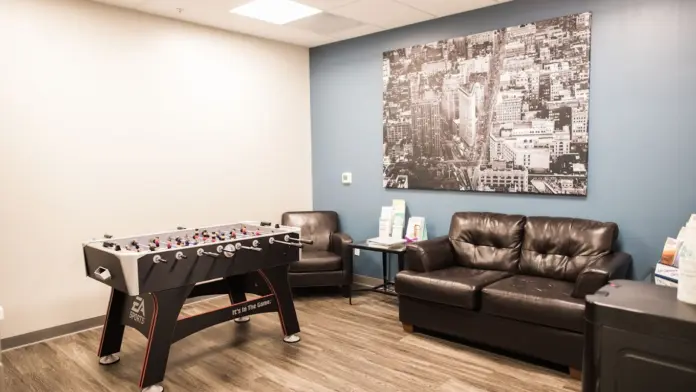
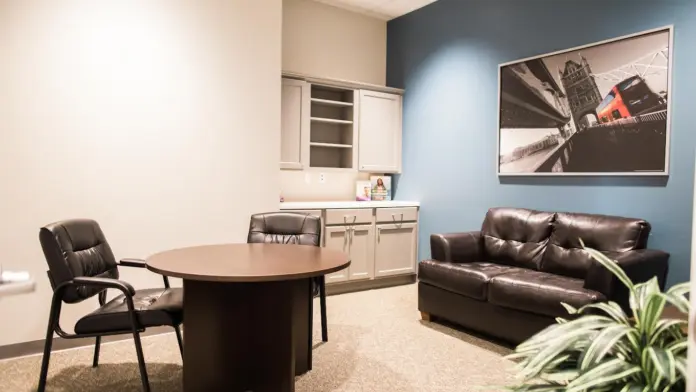
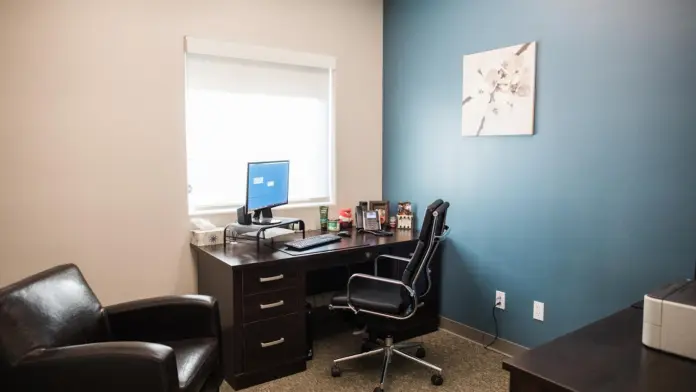
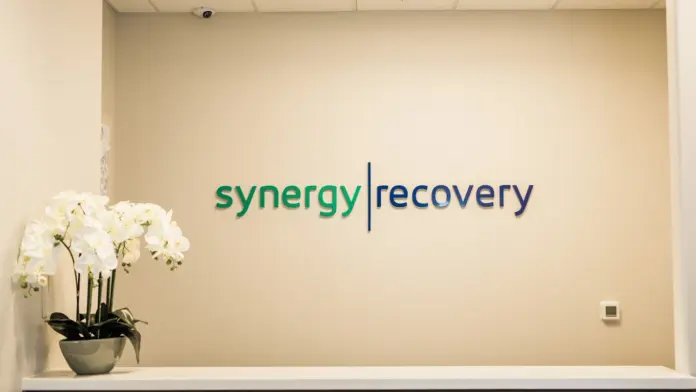
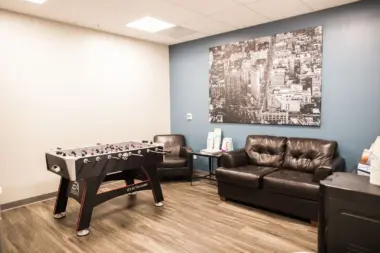
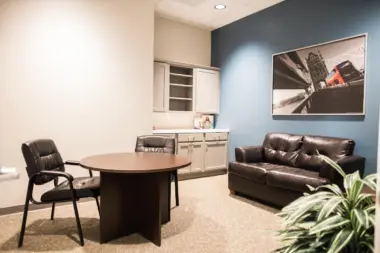
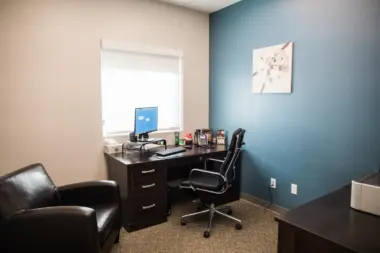
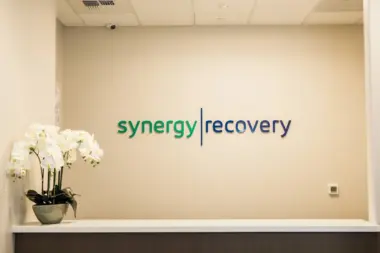
Accepted Insurance
Other Forms of Payment
Private insurance refers to any kind of healthcare coverage that isn't from the state or federal government. This includes individual and family plans offered by an employer or purchased from the Insurance Marketplace. Every plan will have different requirements and out of pocket costs so be sure to get the full details before you start treatment.
Self-pay involves paying for treatment out of your own pocket. You can use savings or credit, get a personal loan, or receive help from family and friends to fund your treatment. If you don't have insurance or your insurance plan doesn't cover a specific program, self-pay can help ensure you still get the care you need.
Sliding scale payments are based on a client's income and family size. The goal is to make treatment affordable to everyone. By taking these factors into account, addiction recovery care providers help ensure that your treatment does not become a financial burden to you or your family, eliminating one barrier to care.
Medicare is a federal program that provides health insurance for those 65 and older. It also serves people under 65 with chronic and disabling health challenges. To use Medicare for addiction treatment you need to find a program that accepts Medicare and is in network with your plan. Out of pocket costs and preauthorization requirements vary, so always check with your provider.
Medicaid is a state based program that helps lower-income individuals and families pay for healthcare. Medicaid covers addiction treatment so those enrolled can use their coverage to pay for rehab. When a program accepts Medicaid the client often pays very little or nothing out of their own pocket.
Addiction Treatments
Levels of Care
Outpatient rehab offers medication, counseling and support for people trying to quit drugs and alcohol. An outpatient setting means that clients visit the center daily for appointments but aren’t in residence. Instead, during outpatient drug and alcohol rehab, clients meet with a doctor specializing in addiction medicine, addiction counselors and others to learn how to manage their illness and work towards recovery.
Inpatient rehab provides intensive treatment for clients exiting detox, those in early recovery, and those at an elevated risk of relapse. Unlike outpatient drug rehab, clients receiving inpatient care reside at the facility for the duration of the program. The length of stay may range from two weeks to 18 months or more, depending on the client's needs and the program's design. Inpatient treatment typically involves extensive addiction education and recovery-focused life skills training.
Outpatient rehab programs differ from center to center. With their intensive outpatient program in Bakersfield, CA, clients who do not need supervised detox can receive medical support and medicine to help wean them off the substances they are addicted to. Dr. Trobisch can prescribe various medications that can help you safely recover from opioid- and alcohol addiction. In addition to medical treatment for addiction, Synergy Recovery Services also offers counseling to help people address the root of what led them to the addiction. Counseling sessions focus on managing situations that lead to relapse, learning how to live in recovery, handling cravings and more. Their counselors are experienced at motivating and encouraging individuals with addiction, and we always treat you with respect and dignity. By attending the intensive outpatient rehab program at Synergy Recovery Services, you can continue going to work or school while getting help for your drug or alcohol addiction. Because both counseling and treatment take place at a medical office (also offering medical weight loss and cosmetic services) your treatment is discreet and nobody will judge you for attending an outpatient rehab program.
When addicted, quitting your drug of choice suddenly can be dangerous. That's why experts agree a medically assisted detox is the safest way to remove addictive substances from the body. Usually done in an inpatient setting, your vitals signs and overall well being are consistently monitored and rechecked in order to keep you safe and ensure the detox is successful.
Treatments
The goal of treatment for alcoholism is abstinence. Those with poor social support, poor motivation, or psychiatric disorders tend to relapse within a few years of treatment. For these people, success is measured by longer periods of abstinence, reduced use of alcohol, better health, and improved social functioning. Recovery and Maintenance are usually based on 12 step programs and AA meetings.
Drug rehab in California teaches participants constructive ways to stay clean and sober. Treatment revolves around helping individuals stop using the substance they are addicted to and learn healthy habits to avoid relapse.
A combined mental health and substance abuse rehab has the staff and resources available to handle individuals with both mental health and substance abuse issues. It can be challenging to determine where a specific symptom stems from (a mental health issue or an issue related to substance abuse), so mental health and substance abuse professionals are helpful in detangling symptoms and keeping treatment on track.
Opioid rehabs specialize in supporting those recovering from opioid addiction. They treat those suffering from addiction to illegal opioids like heroin, as well as prescription drugs like oxycodone. These centers typically combine both physical as well as mental and emotional support to help stop addiction. Physical support often includes medical detox and subsequent medical support (including medication), and mental support includes in-depth therapy to address the underlying causes of addiction.
In California, substance abuse treatment programs can help individuals with any type of substance use disorders and co-occurring conditions. These rehab programs typically encompass various levels of care, including medically assisted detox, intensive outpatient, outpatient, residential rehab, and partial hospitalization. You can expect clinicians to utilize evidence-based therapies like cognitive behavioral therapy (CBT), dialectical behavioral therapy (DBT), and mindfulness to help you achieve and sustain your recovery. The rehab's clinical team can provide a comprehensive assessment to determine the appropriate level of care and medical support you may need.
Programs
Adult rehab programs include therapies tailored to each client's specific needs, goals, and recovery progress. They are tailored to the specific challenges adult clients may face, including family and work pressures and commitments. From inpatient and residential treatment to various levels of outpatient services, there are many options available. Some facilities also help adults work through co-occurring conditions, like anxiety, that can accompany addiction.
Young adulthood can be an exciting, yet difficult, time of transition. Individuals in their late teens to mid-20s face unique stressors related to school, jobs, families, and social circles, which can lead to a rise in substance use. Rehab centers with dedicated young adult programs will include activities and amenities that cater to this age group, with an emphasis on specialized counseling, peer socialization, and ongoing aftercare.
Men face specific challenges and concerns when seeking addiction treatment. Gender-specific recovery programs help them tackle these issues head-on in an environment that's focused, targeted, and distraction-free. It also gives them the opportunity to connect with and learn from other men who have been through a similar journey and can offer support for the next step.
Rehabs for women provide a safe, nurturing space for female clients to heal. These treatment programs consider the specific obstacles that women can face during recovery and place a special emphasis on mental, social, physical, and reproductive health. They explore how each woman's experience has shaped the trajectory of their substance use, addressing issues such as sexual abuse and past trauma.
Clinical Services
Group therapy is any therapeutic work that happens in a group (not one-on-one). There are a number of different group therapy modalities, including support groups, experiential therapy, psycho-education, and more. Group therapy involves treatment as well as processing interaction between group members.
In individual therapy, a patient meets one-on-one with a trained psychologist or counselor. Therapy is a pivotal part of effective substance abuse treatment, as it often covers root causes of addiction, including challenges faced by the patient in their social, family, and work/school life.
Family therapy offers a platform for members to have an open dialogue about the challenges that addiction has placed on the family unit. Through guided sessions, therapists can help families develop healthy communication skills and address unresolved issues. By working together toward a common goal, they help to support their loved one's sobriety.
Amenities
-
Recreation Room
-
Private Setting
Staff & Accreditations
Staff
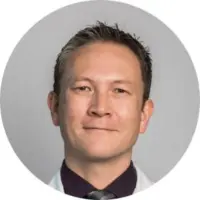
Jan Trobisch, PhD
President

Liz Sauceda
Manager

Claudia Barron
Administrative Assistant

Allie Blanquette
Operations Manager
Accreditations

The Commission on Accreditation of Rehabilitation Facilities (CARF) is a non-profit organization that specifically accredits rehab organizations. Founded in 1966, CARF's, mission is to help service providers like rehab facilities maintain high standards of care.
CARF Accreditation: Yes

The Joint Commission, formerly known as JCAHO, is a nonprofit organization that accredits rehab organizations and programs. Founded in 1951, the Joint Commision's mission is to improve the quality of patient care and demonstrating the quality of patient care.
Joint Commission Accreditation: Yes

LegitScript has reviewed Synergy Recovery Services as part of their certification program, and has determined that it meets the LegitScript standards for legality, safety and transparency.
LegitScript verified in
Contact Information
7910 Downing Ave
Suite # 200
Bakersfield, CA 93308




